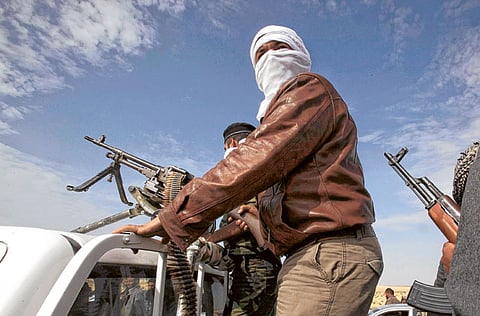Fifth column stalks interim government
Loyalists lurk among revolutionaries

As I was leaving eastern Libya's recently formed interim government office by the courthouse at the corniche with three other journalists, a young doctor approached us, with government credentials hanging from his neck. He spoke in clear English, a rarity in Libya, asking us if we wanted a story.
He said he knew of a place where there was looting and stealing going on that very minute.
"It's five minutes away," he said. "I can take you in my car".
We agreed.
As we walked to the car, we realised that his opinions significantly differed from those of other revolutionaries. He wasn't very confident about the success of the revolution and kept saying it was bound to fail. I had second thoughts about entering the car with him, and so did two of the other journalists I was with. But as he opened his car door, I noticed the box of medicine he said he had been using to treat injured people.
Noticing our apprehension, he said not to worry about being out so late after dark. "I have a special yellow number plate".
"What does that mean," I asked.
"That I'm a government official," he said.
"Gaddafi government?"
"No, the new government."
"The new government has already issued new number plates? It was formed just days ago,"
"Yes. Of course it has," he said.
As I sat in the car, I looked around for weapons and didn't find any. I made sure to block the glove compartment firmly with my knee in case he decided to reach for it. I had a very bad feeling about this.
We drove for about 20 minutes to outskirts of the city, despite him saying that the shop was only five minutes away. On the way, his views on the revolution became clear. "It's going to fail. I can guarantee that. The people that are running this so called revolution are corrupt to the core. They are in it for the money and power."
"Do you support Gaddafi," I asked.
"I didn't before. But I do now. I don't say it because I'll get killed for it, and so will my family, but the fact is that there are murders and burglaries going on. People's properties are being confiscated at gun point. This is not a revolution. This is thuggery," he said.
As we drove on, the radical nature of his views on the revolution and its leadership became clearer.
He drove round and round and ended up on a dark street. He pulled up in front of a large metal gate and sounded the car horn. About six youths slid open the gate, holding AK47s, their faces covered in kafeyas (traditional Arab headdress).
Beyond the gate, I could see barren land with a few small buildings in the middle. At that point, all four of us in the car decided we did not want to continue. A female journalist even went as far as opening the door.
I politely apologised to the doctor and asked him to turn back. He protested.
Tensions rose. I repeated the request, this time raising my voice. I got the feeling that he was trying to signal for the guards to move out of the way so he could accelerate into the compound against our will. He wanted to discuss. I demanded that he put the car in reverse, getting ready to do it myself if he did not comply.
Current conditions
He then obliged us and I agreed to talk about it. I apologised again and asked him to understand that we were not comfortable going in considering the current conditions and that we were not familiar with the city. He looked disappointed, but agreed to take us home.
Aside from the volatile security situation in Benghazi, the experience highlighted the fact that there are people strongly opposed to the interim government with full clearance to walk the halls of its offices and overhear its meetings.
I am not alone in thinking that there is more than meets the eye about some of the people we meet in Benghazi. Other journalists and aid workers I have spoken to also say they have had experiences which lead them to question who is trustworthy.
There could be a Fifth Column roaming the streets of Benghazi and the halls of the interim government's offices that may just be waiting to surface if or when Gaddafi loyalists decide to retake the city. And that is likely to be very messy.



